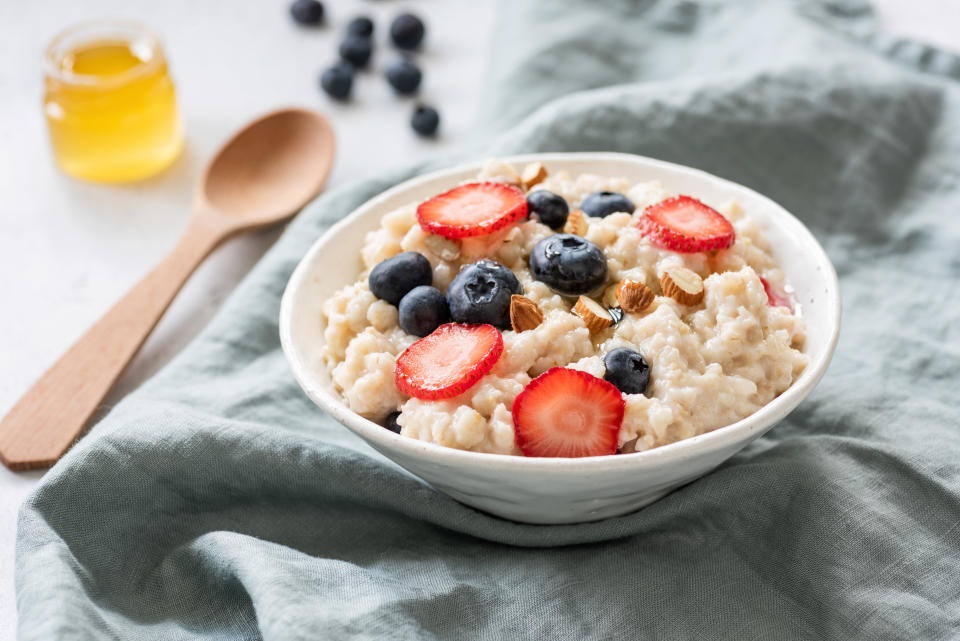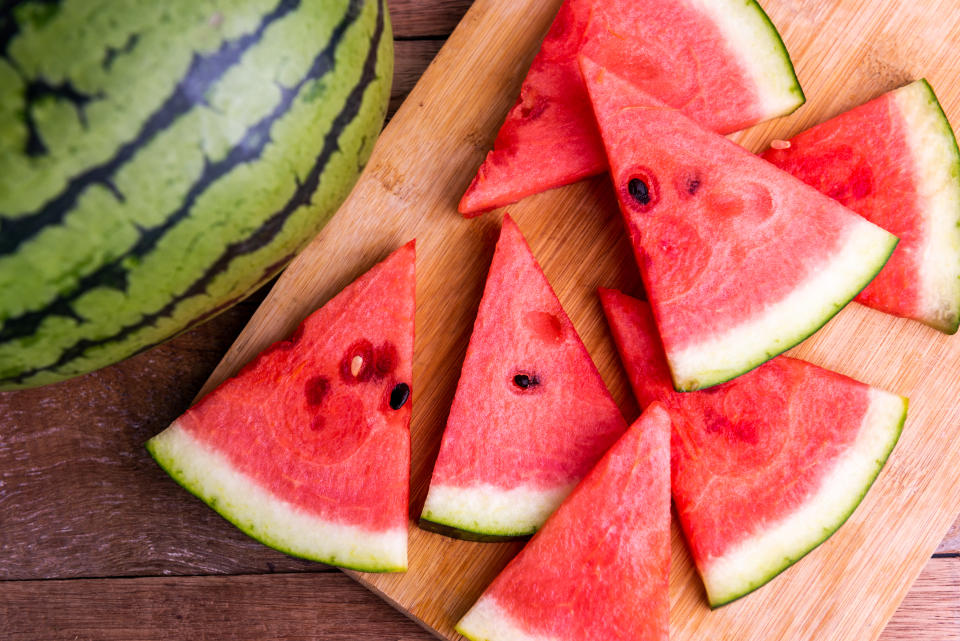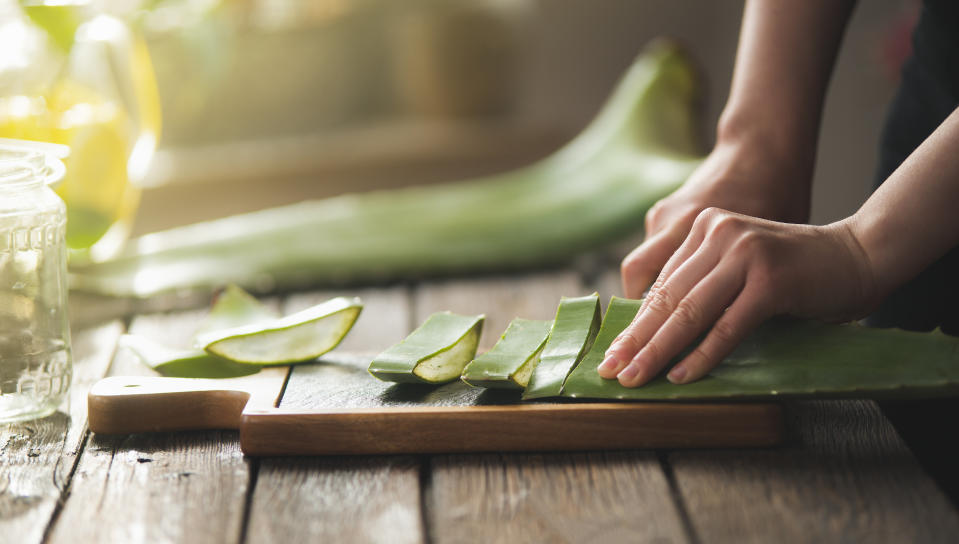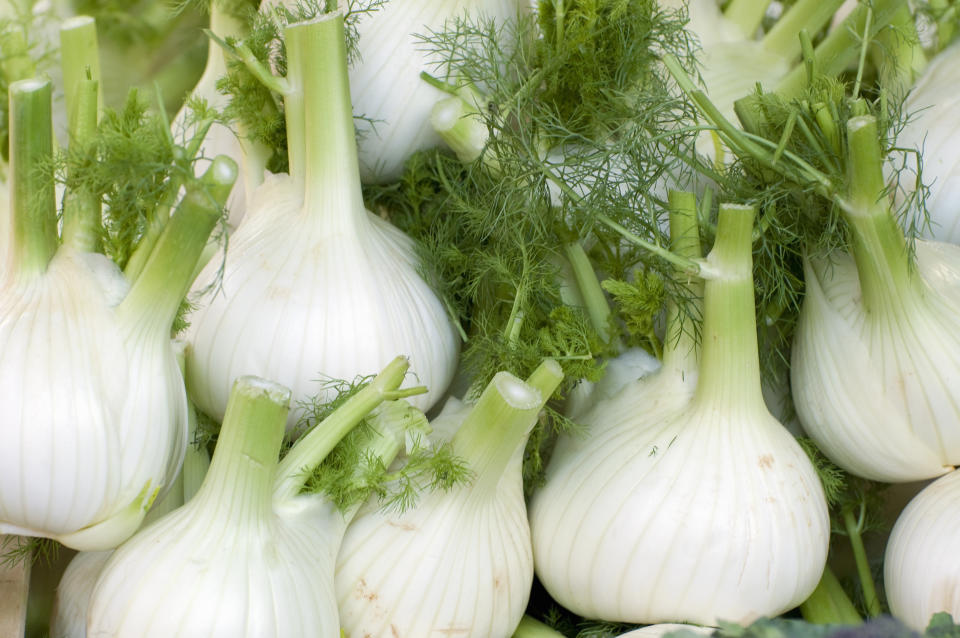Registered Dietitians Are Sharing Tips And Foods That Will Help If You Suffer From Acid Reflux And Heartburn
Regardless of what you celebrate, you’ve probably started indulging in some sort of delicious holiday fare by now. Maybe you’re dipping latkes into sour cream and applesauce, sipping on eggnog and holiday-themed cocktails, or munching on sugar cookies, pie, gingerbread, mashed potatoes and stuffing. And you probably aren’t planning to stop any time soon.
To that, we say: More power to you! If there’s ever a time to indulge in delicious food, it’s the holidays. But the combination of richer foods and the volume many of us are consuming means one thing: It’s heartburn and acid reflux season.

Wondering what the difference between heartburn and acid reflux is? According to Healthline, acid reflux is a common medical condition that can range in severity from mild to serious, and heartburn is a symptom of acid reflux.
While many of us accept heartburn as an unpleasant side effect of the month of December, it doesn’t have to be that way. There’s actually a lot you can do to avoid heartburn in the first place:
1. “Try eating smaller meals instead of three large meals,” suggested Amy Shapiro, a registered dietitian and nutritionist.
“When we eat large meals, it puts upward pressure on our esophagus, causing heartburn, and also large meals cause our bodies to produce more stomach acid, which can lead to heartburn.”
2. Eating slowly can help, too.
“This will allow you to chew your food, digest more easily and prevent overeating, since your brain will have time to realize you are full before you eat too much,” Shapiro said.
3. You can also try cutting off the indulgences too close to bedtime.
“When you lie down, the food in your stomach presses on your esophageal sphincter,” Shapiro said. “By not having a lot of food in your stomach, your heartburn will decrease. Try to stop eating three hours before bedtime.”
Of course, sometimes the heartburn just hits, and there’s not a whole lot you can do about it. When that happens, these foods and drinks can help.
1. Oatmeal

High-fiber foods like oatmeal can work wonders when you’re dealing with heartburn. “Oatmeal, brown rice and vegetables, plus foods that are lower in acidity like bananas, cauliflower and nuts, are helpful to offset strong stomach acid,” said Maggie Michalczyk, a registered dietitian.
Shapiro added that whole grains are easy to digest and don’t create acid in the body. “Additionally, when simply prepared, they are mild and easy on the GI tract.”
2. Watermelon

“Foods that have a high water content help weaken stomach acid,” noted Michalczyk. If watermelon isn’t your thing, lettuce and cucumbers work, too.
3. Low-fat yogurt

While many are opting for full-fat dairy products these days, when you’re dealing with heartburn it’s better to stick with low-fat yogurt or milk, as it can offset stomach acid. “Low-fat yogurt and low-fat milk may help relieve heartburn symptoms as they’re happening,” Michalczyk said. “It’s important that they’re low-fat though, because fat can further aggravate acid reflux.”
4. Ginger tea, or ginger in a smoothie

Ginger is known for working wonders on the digestive system (if you’ve ever had a bout of nausea eased by ginger, you know this to be true), and it can help with heartburn too. “Fresh ginger is a great natural remedy to help with digestion, so keeping ginger tea on hand when heartburn hits is a good idea,” Michalczyk said.
Looking for something cooler? Add some fresh ginger to your morning smoothie.
5. Vegetables

Vegetables don’t exactly get a starring role in the month of December. But if you’re dealing with heartburn, veggies might just be your best friend. “Leafy greens, root veggies and even peas are mild, improve digestion and help to prevent GERD [gastroesophageal reflux disease], as long as they are not cooked with lots of garlic or spice,” Shapiro said. “Enjoy in abundance at any holiday meal!”
6. Aloe vera

We typically think of aloe vera as that green, slimy substance that helps ease sunburns. But guess what? “Just like it puts out the fire on your skin from a sunburn, aloe vera can soothe reflux or acid indigestion when taken internally,” Shapiro said. “You can blend it or make a smoothie or simply purchase aloe vera juice from your local market to soothe symptoms on the spot.”
7. Parsnips

By adding parsnips to heavier meals, you can increase flavor in your food without increasing fat, meaning it won’t be nearly as heartburn-inducing (but just as, if not more, delicious). “Try to increase the load of fresh produce in your meals, while decreasing the amount of fat,” said Kylene Bogden, a registered dietitian-nutritionist and wellness adviser for Love Wellness.
“For example, if you are getting ready to prepare a creamy winter soup, try pureeing cooked parsnips or potatoes for half of the base instead of using the entire amount of heavy cream that the recipe calls for. This is how we increase flavor and nutrient density while decreasing fat. Most importantly, we are helping to stop reflux in its tracks.”
8. Chamomile tea

Chamomile tea can be incredibly soothing when you’re dealing with an upset stomach, said Tracy Lockwood Beckerman, a registered dietitian based in New York City. “The soothing sips and aromas of the chamomile help to soften any post-meal acidic burn,” she explained.
9. Fennel

By throwing some fennel in your dish, you can make your meal less acidic. “Fennel is an excellent alkaline food to help blunt elevated acid levels,” she said. “That way, it may help to balance the high pH of other components of the dish and offset high stomach acid.”
This post was previously published on HuffPost.


